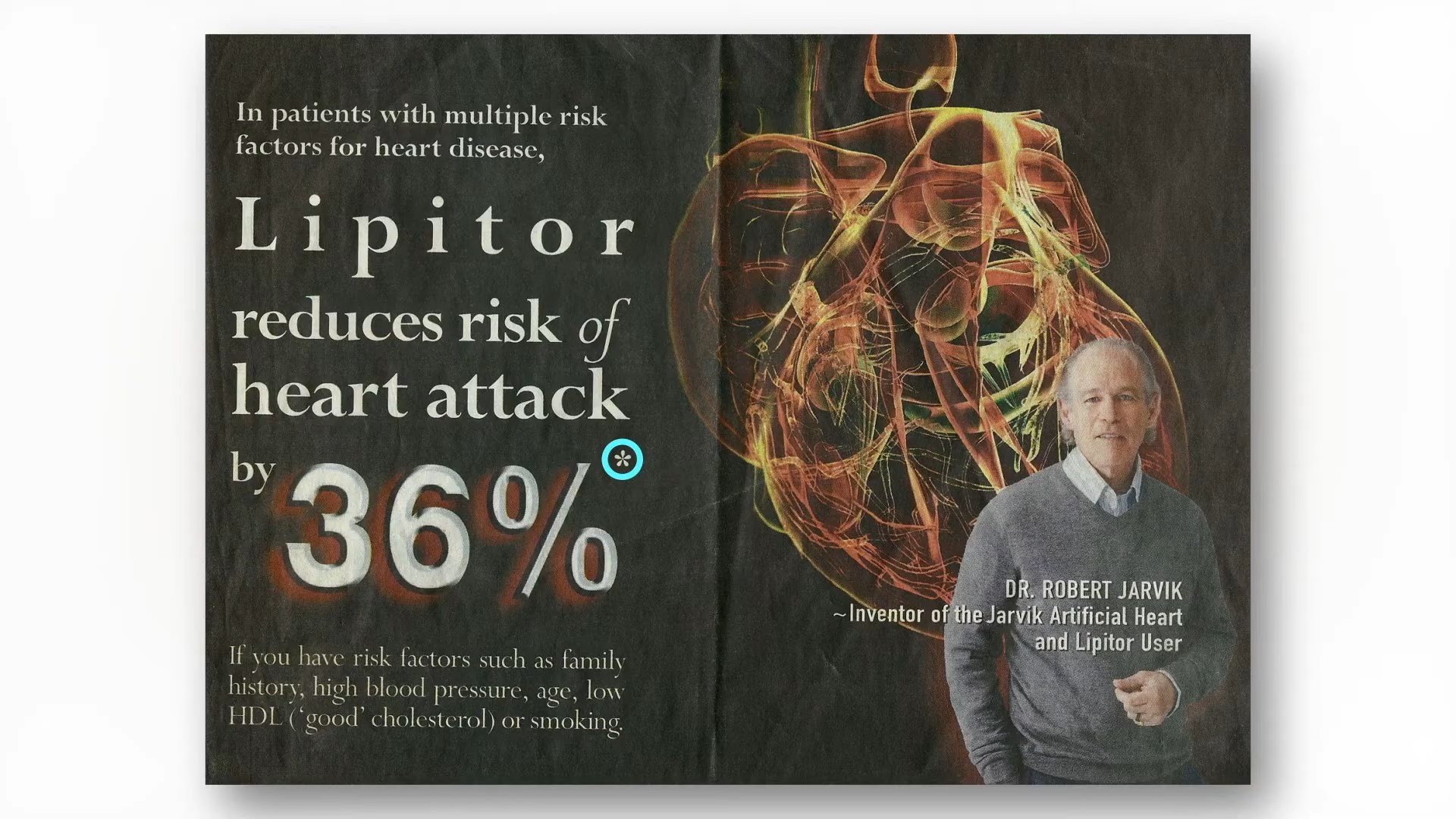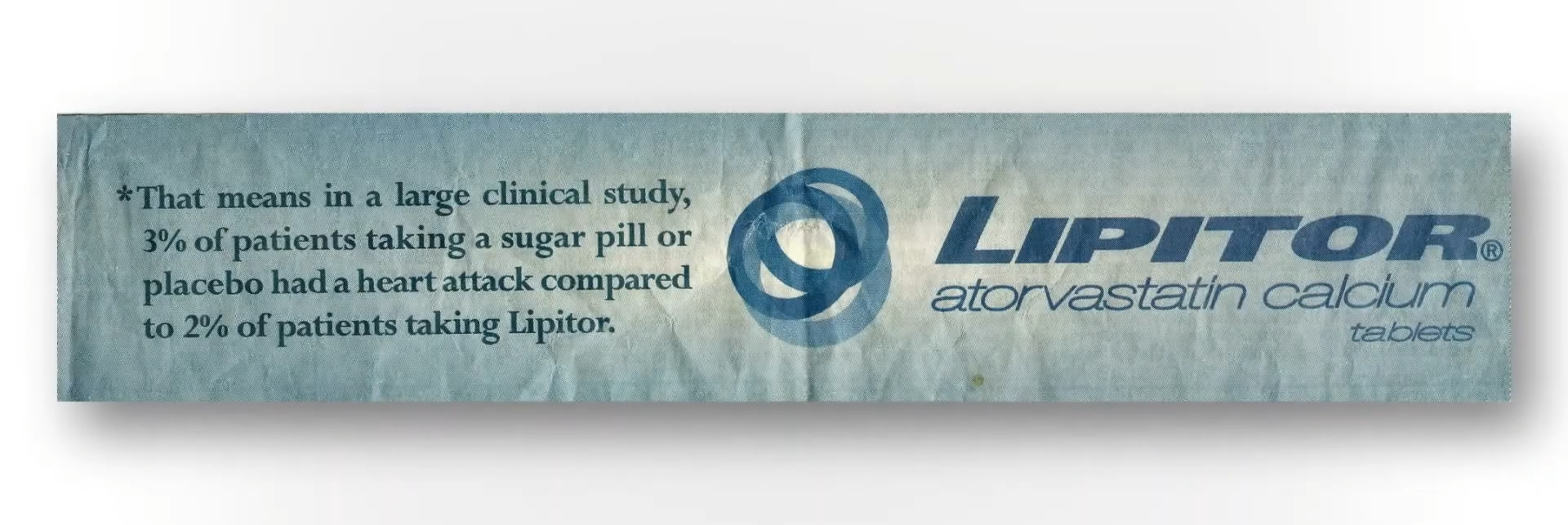What’s the soiled little secret of medication for way of life illnesses?
Drug corporations go out of their means—in direct-to-consumer advertisements, for instance—to “current pharmaceutical medicine as a most popular resolution to ldl cholesterol administration whereas downplaying way of life change.” You see this echoed within the medical literature, as on this editorial within the Journal of the American Medical Affiliation: “Regardless of many years of exhortation for enchancment, the excessive prevalence of poor way of life behaviors resulting in elevated heart problems danger elements persists, with myocardial infarction [heart attack] and stroke remaining the main causes of dying in the US. Clearly, many extra adults may benefit from…statins for main prevention.” Do we actually must put extra individuals on medicine? A reply was published within the British Medical Journal: “As soon as once more, docs are implored to ‘get actual’—cease hoping that efforts to assist their sufferers and communities undertake wholesome way of life habits will succeed, and begin prescribing extra statins. This can be a self-fulfilling prophecy. Notice that the creator of those feedback [the pro-statin editorial] disclosed receipt of funding from 11 drug corporations, at the least 4 of which produce or are creating new lessons of cholesterol-lowering brokers,” which make billions of {dollars} a 12 months in annual gross sales.
Each time the ldl cholesterol tips expand the variety of individuals eligible for statins, they’re decried as a “massive kiss to massive pharma.” That is comprehensible, because the majority of guideline panel members “had trade ties,” monetary conflicts of curiosity. However lately, all the most important statins are off-patent, so there are cheap generic variations. For instance, the most secure, simplest statin is generic Lipitor, bought as atorvastatin for as little as just a few {dollars} a month. So, these days, the ldl cholesterol tips are not essentially “a part of an trade plot.”
“The US lifestyle is the issue, not the rules…” The rationale so many individuals are candidates for cholesterol- and blood-pressure-lowering medicines is that so many individuals are taking such horrible care of themselves. The underside line is that “people should take extra duty for their very own well being behaviors.” What in case you are unwilling or unable to enhance your food plan and make way of life adjustments to deliver down that danger? In case your ten-year danger of getting a coronary heart assault is 7.5 p.c or extra and going to remain that means, then the advantages of taking a statin drug doubtless outweigh the danger. That’s actually so that you can resolve, although. It’s your physique, your alternative.
“Whether or not or not the general benefit-harm stability justifies the usage of a medicine for a person affected person can’t be decided by a tips committee, a well being care system, and even the attending doctor. As a substitute, it’s the particular person affected person who has a basic proper to resolve whether or not or not taking a drug is worth it.” This was acknowledged by a few of medication’s “historic luminaries resembling Hippocrates,” however “solely in current many years has the medical career begun to shift from a paternalistic ‘physician is aware of finest’ stance in direction of one explicitly endorsing patient-centered, evidence-based, shared decision-making.” One of many issues with speaking statin proof to assist this shared decision-making is that the majority docs “have a poor understanding of ideas of danger and likelihood and…rising publicity to statistics in undergraduate and postgraduate schooling hasn’t made a lot distinction.” However that understanding is important for preventive medication. When docs supply a cholesterol-lowering drug, “they’re doing one thing fairly completely different from treating a affected person who has sought assist as a result of she is sick. They’re not a lot docs as life insurance coverage salespeople, peddling deferred advantages in alternate for a small (however definitely not negligible) ongoing inconvenience and price. On this new type of medication, not understanding danger is the equal of not understanding in regards to the circulation of the blood or primary anatomy. So, let’s dive in and see precisely what’s at stake.
Beneath and at 3:55 in my video Are Doctors Misleading Patients About Statin Risks and Benefits? is an advert for Lipitor. When drug corporations say a statin reduces the danger of a coronary heart assault by 36 p.c, that’s the relative danger.

If you happen to comply with the asterisk I’ve circled after the “36%” within the advert, you’ll be able to see how they came up with that. I’ve included it right here and at 3:56 in my video. In a big scientific examine, 3 p.c of sufferers not taking the statin had a coronary heart assault inside a sure period of time, in comparison with 2 p.c of sufferers who did take the drug. So, the drug dropped coronary heart assault danger from 3 p.c to 2 p.c; that’s a couple of one-third drop, therefore the 36 p.c lowered relative danger statistic. However one other means to take a look at going from 3 p.c to 2 p.c is that absolutely the danger solely dropped by 1 p.c. So, in impact, “your probability to avoid a nonfatal coronary heart assault through the subsequent 2 years is about 97% with out remedy, however you’ll be able to enhance it to about 98% by taking a Crestor [a statin] day-after-day.” One other technique to say that’s that you just’d need to deal with 100 individuals with the drug to stop a single coronary heart assault. That statistic could shock lots of people.

If you happen to ask sufferers what they’ve been led to believe, they don’t suppose the prospect of avoiding a coronary heart assault inside just a few years on statins is 1 in 100, however 1 in 2. “On common, it was believed that the majority sufferers (53.1%) utilizing statins would keep away from a coronary heart assault after statin remedy for five years.” Most sufferers, not simply 1 p.c of sufferers. And this “disparity between precise and anticipated impact could possibly be considered as a dilemma. On the one hand, it’s not ethically acceptable for caregivers to intentionally assist and preserve illusive remedy expectations by sufferers.” We can’t mislead individuals into considering a drug works higher than it actually does, however however, how else are we going to get individuals to take their capsules?
When requested, individuals want an absolute danger discount of at the least about 30 p.c to take a cholesterol-lowering drug day-after-day, whereas the precise absolute danger discount is just about 1 p.c. So, the soiled little secret is that, if sufferers knew the reality about how little these medicine truly labored, nearly nobody would conform to take them. Docs are both not educating their sufferers or actively misinforming them. Given that almost all of sufferers count on a a lot bigger profit from statins than they’d get, “there’s a pressure between the affected person’s proper to find out about benefiting from a preventive drug and the doubtless discount in uptake [willingness to take the drugs] if they’re so knowledgeable,” and study the reality. This sounds terribly paternalistic, however lots of of hundreds of lives could also be at stake.
If sufferers were absolutely knowledgeable, individuals would die. About 20 million People are on statins. Even when the medicine saved 1 in 100, that might imply lots of of hundreds of lives misplaced if everybody stopped taking their statins. “It’s ironic that informing sufferers about statins would enhance the very outcomes they have been designed to stop.”











